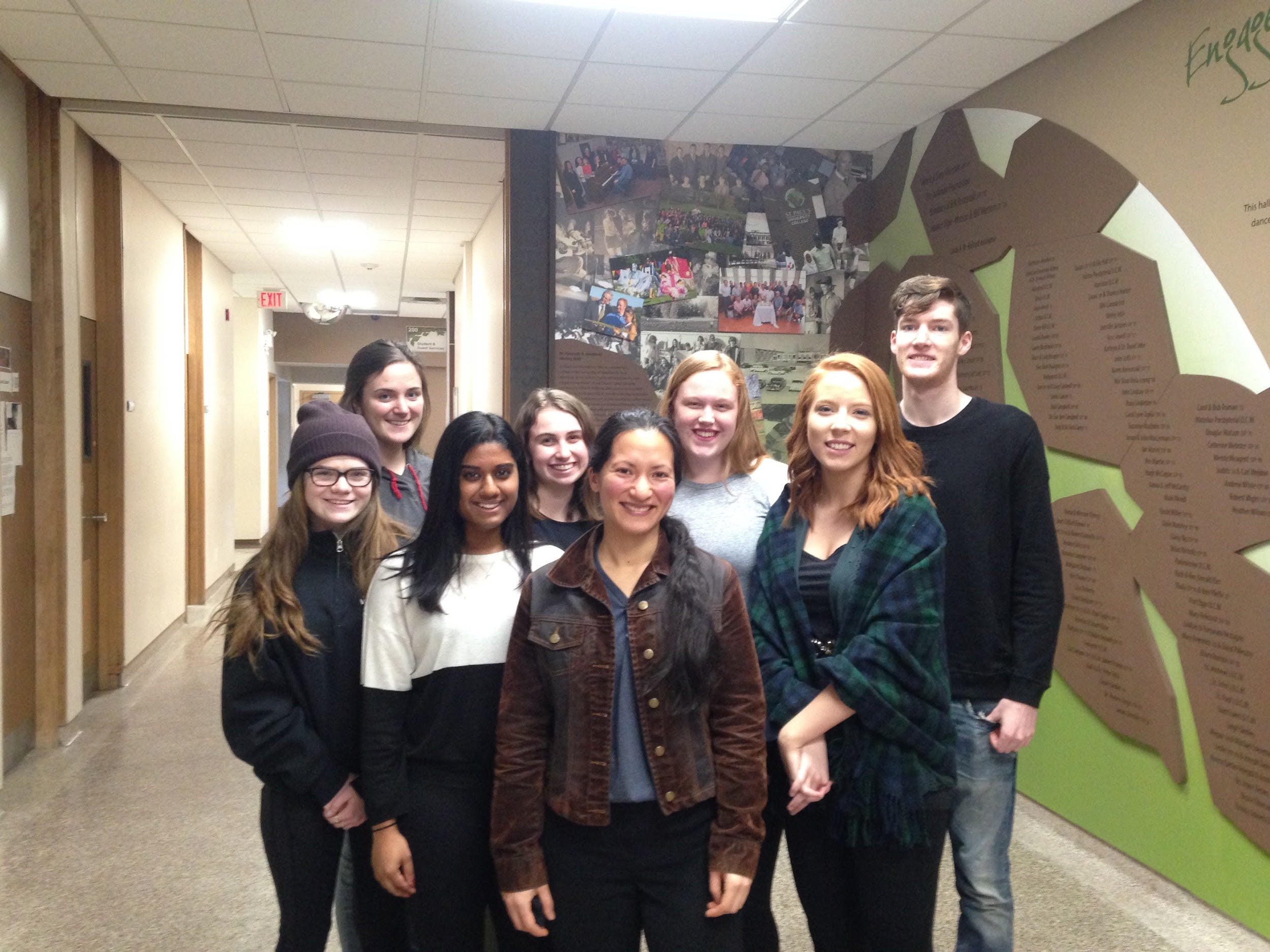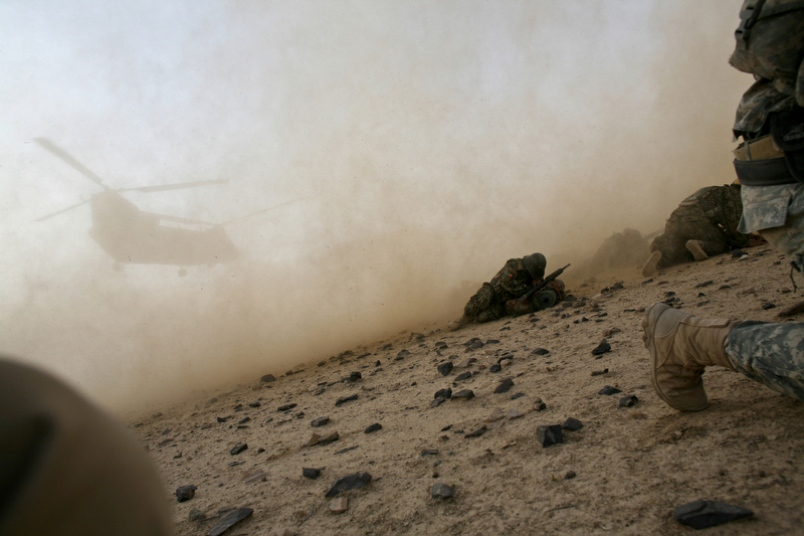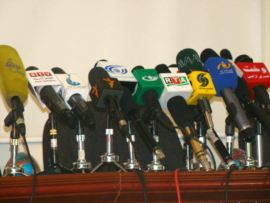Media Reconstruction in Afghanistan:
How Technology and Development Don’t Always Correlate

International Development students pose for picture with guest Lecturer Sarah Kamal.
Left to Right: Lorena McNamara, Hanna Hett, Rusha Jeyathavapiriya, Kaytlin Legris, Sarah Kamal, Carly Mirrlees, Rachel Friesen, John Scarrow
It is a common perception that technology brings benefits to human society. After all, with it we have come to know the luxuries of swift transportation, instant communication, and extremely comfortable housing. Technology can be appreciated for decreased infant mortality rates and increased human life spans. Thus, it is easy to think that if we transferred this technology to countries who are currently living without it, we could solve many development issues. However, in our International Development 101 class on Thursday, March 24th, we were taught different perspectives.

We were lucky enough to have a lecture from Sarah Kamal, a development professional based in Montreal, Canada. Kamal spent several years working in Afghanistan after the Taliban regime ended in 2001, hence gaining invaluable experience. Afghanistan is a country that had been infested with conflict for decades. Her presentation was on the United States ‘Media Reconstruction’ project in Afghanistan (only after their bombing campaign in 2001), and she was able
to provide us with a unique perspective of how technology and development are correlated. After a lecture about how technology affects development, it was very intriguing to hear how technology was applied to a post-war nation from someone who was involved first-hand.
In looking at the statistical outcomes of the work completed in Afghanistan, the development looked to be very positive: within five to seven years after the reconstruction first started there were 100s of publications, over 50 radio stations, 12 TV stations, and 1000s of journalists. Women's rights —which had been all but non-existent with the Taliban in charge—were improving, and Kamal herself worked on launching a women’s radio station (Pierre Elliot Trudeau Foundation, 2016).

However, when Kamal presented the various impacts that were experienced in Afghanistan due to the media reconstruction, we realized that the numbers may not add to up to success, and that ‘leap-frogging’ development with technology can be inappropriate in many cultures. The work was implemented without understanding of the country’s vast history or their culture, and was Anglo-US biased. It caused a sense of destabilization, weakened the central government, and had no long-term plan as to how it would pay for the many radio and television stations.
Since the drop of the Taliban in 2001, Afghanistan as a country has evolved at a fast speed in terms of media. However, unfortunately association with any type of media, such as a journalist could be extremely dangerous in many parts of afghanistan. Many journalists have been threatened or killed if they continued their work. They still receive a lack of support for freedom of the press even to this day (Procter 2015).
This made us wonder about the role of technology in other developing countries. In Canada, we are so interconnected with information communication technologies (ICTs) that it’s difficult to imagine life without them. In contrast, in Afghanistan, all media types were prohibited under Taliban rule. It took years for Canada to evolve to this current dependence on technology, and thus we were allowed appropriate adaptation time. Thus, as development workers, with little understanding of how different cultures and how they will react to ICTs, is it acceptable to think that we can ‘help’ them by implementing ICTs?
Behaviour and values of people connected through information communication technologies around the world today may be more similar than they are to those of people within the same country who have less access to the network of information technologies. In Afghanistan, there was serious media control for a long time under Taliban rule. Without people being connected through ICTs it was hard for people to share progressive ideologies in a manner that would change the status quo. ICTs can be used to control as well as to empower, and can foster national identity as well as to better understand other cultures.
It was fascinating to learn from Kamal’s perspective on how technology can impact development. In ways such as letting a country prevail through the benefits of communication and informations technology provides or stunt a country's growth by preventing the use of technology in general. Technology is all around us in the present and it will continue to advance and become even more incorporated within our lives in the future. As learnt during the presentation, media itself has a huge influence on how information, values and beliefs can be broadcasted globally.
Contact Information
Hanna Hett: hhett@uwaterloo.ca
Rusha Jeyathavapiriya: rushamoon@hotmail.com
Lorena McNamara: lmcnamar@uwaterloo.ca
Kaytlin Legris: kalegris@uwaterloo.ca
John Scarrow: scarrowjohn@gmail.com
Carly Mirrlees: cmamirrl@uwaterloo.ca
For further information:
Afghanistan's Fourth Estate: Independent Media
Reference list
Azizi, M. (Artist). (2010). Media in Afghanistan. [Image of painting]. Retrieved from https://www.mtholyoke.edu/~azizi22m/classweb/afgmedia/index.html
Brown, D. (Artist). (2013). U.S. soldiers with Company C, 2nd Battalion, 508th Parachute Infantry Regiment. [Image of painting]. Retrieved from http://www.stripes.com/news/middle-east/with-little-fanfare-afghanistan-war-drags-into-13th-year-1.245181
Pierre Elliot Trudeau Foundation. (2007). Sarah Kamal. Retrieved March 27, 2016, from Foundation Pierre Elliot Trudeau Foundation: http://www.trudeaufoundation.ca/en/community/sarah-kamal
Procter, A. (2015, August 10). Afghanistan’s Fourth Estate: Independent Media. In United States Institute of Peace. Retrieved April 4, 2016, from http://www.usip.org/publications/2015/08/10/afghanistan-s-fourth-estate-independent-media